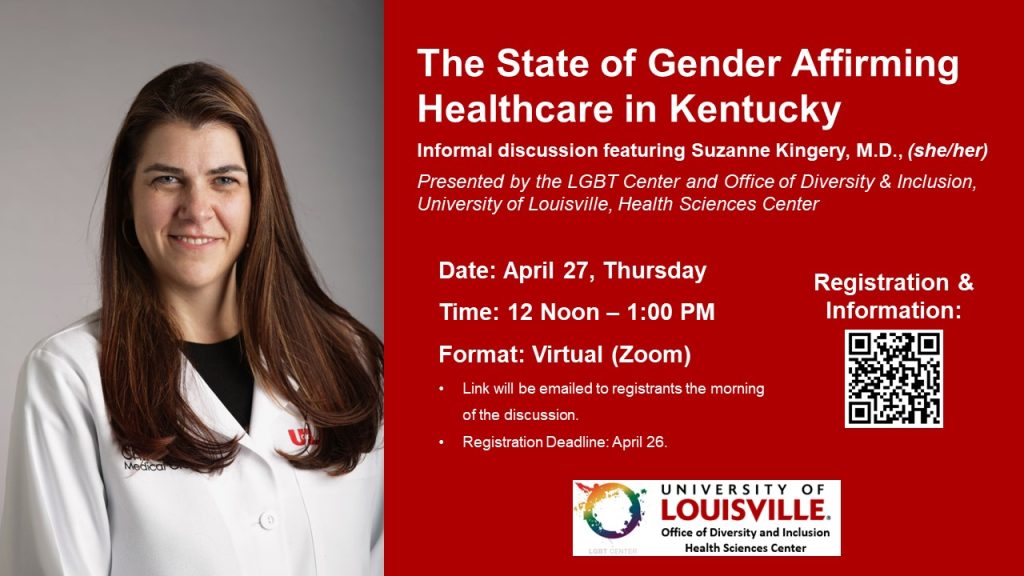Medical professionals and community activists organizing to provide gender-affirming healthcare to transgender and gender-nonconforming Kentuckians

by Belle Townsend
she/they
[email protected]
With Omnibus anti-trans bill SB 150 passing in Kentucky, transgender and gender non-conforming Kentuckians and their loved ones are worried for their safety and access to life-saving medical care.
Hosted by Suzanne Kingery, M.D. (she/her) and presented by the LGBT Center and Office of Diversity & Inclusion, University of Louisville, Health Sciences Center, The State of Gender Affirming Healthcare in Kentucky will be a discussion offering an “overview of the recently passed KY Senate Bill 150.” This discussion will cover the “overall impact of SB 150 on gender-affirming healthcare, implications for trans/non-binary, gender diverse youth and their families, what current and future healthcare providers need to know about the legislation, and questions submitted by participants.” The event will take place on April 27th from 12:00 p.m. to 1:00 p.m., and you can register here.
In preparation for this discussion held by a medical professional, I spoke with someone who is organizing the type of healthcare access that Dr. Kingery offers. I spoke with Oliver Hall (they/them), the Trans Health Director of Kentucky Health Justice Network’s Trans Health Advocacy program.
When asked how SB 150 has affected Hall and their work, Hall replied, “We have had to put a lot more energy into legislative advocacy, both myself coming to Frankfort to testify and attempting to get trans-Kentuckians to come to Frankfort. Additionally, we have been collaborating with The Campaign for Southern Equality to create a resource guide and find a network of providers in neighboring states and telehealth providers who see trans youth so that we can establish a continuum of care for them. We’re doing patient navigation with youth and their families to make sure when necessary they are able to access gender-affirming care out-of-state, CSE is also providing emergency grants for youth and their families. You can find out more about all of those resources here.”
With so much fear about being transgender or gender non-conforming in the state of Kentucky, being able to be connected to resources is everything.

On the accessibility of gender-affirming care in Kentucky, Hall continued, “For adults, gender-affirming care is legal but not always accessible.” This is for a few reasons, “1) Some portions of the state don’t have providers who provide gender-affirming care, and those folks have to travel long distances just to access care. Some surgeries, like Phalloplasty (commonly referred to as bottom surgery), are not currently offered in the state of Kentucky. Further, “2) Medicaid currently has a ban on coverage for gender-affirming surgery.”
But, youth were the target of many of the 400+ anti-LGBTQ+ bills being tracked by the ACLU. Regarding youth access to gender-affirming healthcare, Hall shared that, “care is still currently legal until that portion of the law goes into effect in late June. However, some providers will stop providing that care beforehand. We have a network of providers in near-by/neighboring states like OH, IL, WV, and NC, as well as telehealth providers who have agreed to take on Kentucky patients.”
Regarding resources for youth and their families, KHJN is “doing patient navigation with these youth and their families to help make sure they can still get the care they need. We have also partnered with the Campaign for Southern Equality to create a resource guide, as well as to provide emergency grants to those families.”
Research shows that when gender-affirming care is indicated for youth by their physical and mental health providers, it decreases their risk of suicidality and depression significantly. Hall infers that “there is a reason that Republicans couldn’t find a single young person or provider in the state to testify or speak in support of their bill, and that’s because we have excellent standards of care. They continued to instead bring in doctors from California who chair SPLC designated hate groups like Andre Van Mol.” This only further contributes to what LGBTQ+ rights organizers in Kentucky have been saying: SB 150 and the other bills attacking gender-affirming care are not being pushed by medical professionals or even people from the state of Kentucky.
As Hall put it bluntly, “People are afraid. Youth and their families are afraid. Trans people as a whole are afraid of the increasing attacks nationwide. Kentuckians didn’t support this bill, in fact, the overwhelming majority (71%) opposed this bill. This was not only an attack on trans youth, it was an attack on democracy. Our elected officials do not care about the will of voters or the issues they are actually dealing with, like the teacher shortage and the physician shortage in our state. I am not shocked that our lawmakers aren’t in tune with what working-class Kentuckians need. Lawmakers who supported SB150 are more beholden to their out-of-state donors than they are the people in their district.”

In addition to the informative discussion held by Dr. Kingery and the University of Louisville’s Health Sciences Center, there is a Bluegrass LGBTQ+ Town Hall event at The Carnegie Center in Lexington.
This will take place on April 24, 2023 from 6:00 PM to 7:00 PM. The central focus is “turning disappointment into action” in a town hall on “what’s needed next to build a coalition in defense of LGBTQ+ Kentuckians” according to the frontrunners Lexington Instagram page.













Leave a Reply
Want to join the discussion?Feel free to contribute!